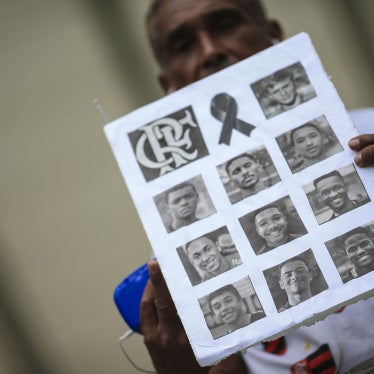Incarcerated youth in Rio de Janeiro endure beatings by guards and other concealed abuses that go unpunished because state juvenile detention centers lack independent monitoring, Human Rights Watch said in a report released today.
The 50-page report, "In the Dark: Hidden Abuses Against Detained Youths in Rio de Janeiro," documents routine physical abuse, squalid living conditions and other forms of inhumane treatment in the state's youth detention centers. The report finds that these abuses persist in large part because there is no effective independent monitoring of the state's juvenile detention centers.
"The state juvenile detention system has operated for too long under cover of secrecy," said Fernando Delgado, the Henry Richardson Labouisse '26 Fellow with the Children's Rights Division of Human Rights Watch and author of the report. "Brutal beatings will remain business as usual until the Rio's state government opens the system to outside scrutiny."
State juvenile detention officials criticized Human Rights Watch's last report on juvenile detention in Rio de Janeiro, released in December, claiming that it contained outdated information and reflected the practices of the prior administration. Human Rights Watch's six-month review of Rio de Janeiro's juvenile detention centers found that detention conditions had actually worsened in several important respects.
Guards administer forceful open-handed blows to youths for petty infractions, such as failing to keep one's head bowed or hands behind one's back when outside the cells. Some guards also beat youths with pieces of wood, which they grotesquely nickname after cartoon characters or pop stars. Collective punishment is common.
Overcrowding is severe at three detention centers—Padre Severino, Santo Expedito and CAI-Baixada. The Santo Expedito detention center, for example, was well over its official capacity when Human Rights Watch first inspected it in July 2003. Youths are now crowded into cellblocks designed for roughly half their numbers.
Critical shortages of staffing, food, and clothing in the three centers increase the risks of violent rebellion. In March, youths at Santo Expedito rioted after authorities suspended classes, recreation and nearly all other activities at the beginning of the year due to staffing shortages. For most of the previous three months, they had spent been locked in their cells with nothing to do.
Public prosecutors have the authority to inspect juvenile detention facilities but almost never do so. Judicial inspectors focus on administrative details—the number of youths, the number of staff, the amount of laundry detergent in each facility—but do not routinely investigate abuses.
The state agency responsible for juvenile detention facilities, the Department of Socio-Educational Action (Departamento Geral de Ações Sócio-Educativas, DEGASE), has an inspector general's office, but the office lacks the independence to carry out its mission.
Outside monitoring efforts are met with hostility and obstruction. After Human Rights Watch researchers inspected three juvenile detention centers in May with authorization from the State Secretariat for Childhood and Youth, DEGASE blocked them from entering other facilities even though DEGASE is subordinate to the secretariat. (Human Rights Watch was able to review practices at the remaining two centers by examining court records and interviewing parents, released youths, detention officials and others familiar with conditions in those centers.)
Human Rights Watch called on state prosecutors and judicial authorities to strengthen their monitoring of the state's juvenile detention system. For its part, DEGASE should provide a complaint system independent of guards and should ensure that all complaints are investigated thoroughly, with appropriate discipline for staff who perpetrate violence and other abuses.
DEGASE should also fill staffing shortages and correct other critical deficiencies in the centers, Human Rights Watch said.
Under Brazil's federal structure, each of Brazil's 26 states administers its own juvenile detention system. But the federal government provides much of the funding that enables states to maintain detention centers, hire guards and provide services to detained youths. The Brazilian Congress should condition such funds on state guarantees of access for independent monitors in juvenile detention centers, Human Rights Watch said.
In contrast to Rio de Janeiro, the state of São Paulo now gives a mothers’ association (Associação de Mães e Amigos de Crianças e Adolescentes em Risco, AMAR) and four other groups from civil society free access—not limited to previously scheduled workshops and presentations—to all its juvenile detention centers, an important advance for the state's troubled juvenile detention system. The state of Pará guarantees representatives of nongovernmental Centers for the Defense of Children and Adolescents access to juvenile detention facilities; the Pará state constitution provides for such access to "each and every legally constituted entity connected to the defense of the child and the adolescent."








